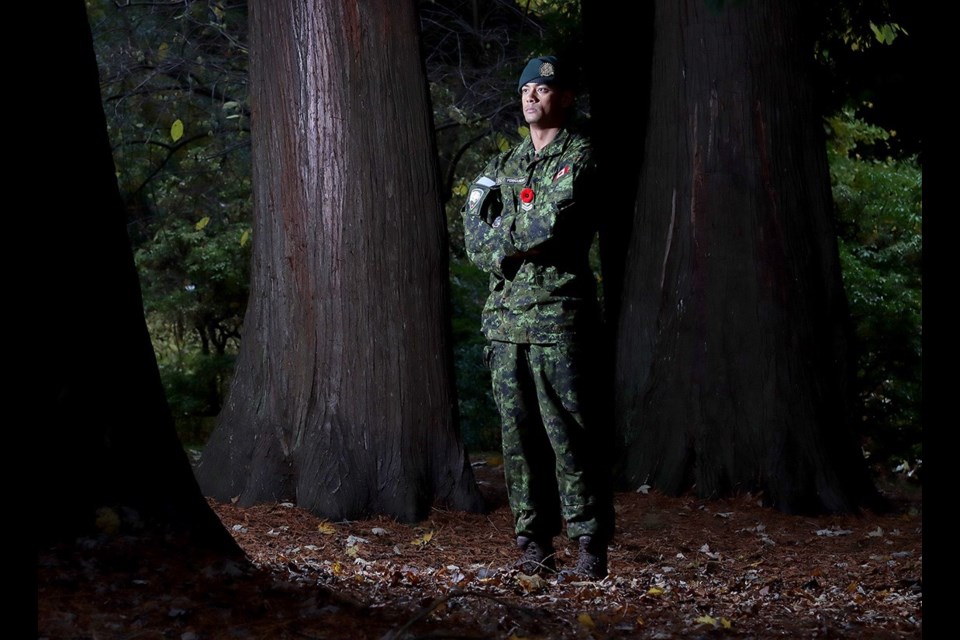As lead for the Royal Westminster Regiment's Exercise Cambrian Patrol team, Master Corporal Justin Fernandes had three options to send alerts during their gruelling exercise in the Welsh mountains: "Help," "We're Lost" or "We're Giving Up."
Luckily, the 23-year-old Coquitlam resident didn't have to send any communication signals to his group's assessors as the eight Army reservists — based in New Westminster — not only completed the 48-hour trek, but also clinched a silver medal in what’s described as NATO's toughest test for infantry soldiers.
"I would 100 per cent do it again," Fernandes told the Tri-City News yesterday, Nov. 9, during an interview at the Regiment's facility on Queens Avenue.
"It's one of the greatest experiences of my life, and we had a great group of soldiers to represent Canada and complete the patrol in Wales."
An annual exercise that sees more than 100 military teams from around the world using regular, reserve and university training officer corps, the Exercise Cambrian Patrol took place in early October in Brecon Beacons National Park.
Hosted by the Headquarters 160th Welsh Brigade, the Patrol is a physical and mental challenge where teams of eight soldiers "ruck" (walking a set distance while carrying a 90-pound backpack) 65 km in mountainous and swampy terrain.
Along the Black Mountains patrol in a fictional demilitarized zone between the countries of Ariana and Atropia, each team performs eight "stands" or simulations to gain points from the British Army supervisors. These include close-target reconnaissance, casualty and CBRN (Chemical, Biological, Radiological, Nuclear) drills.
Patrols have to complete the mission, ending at the Sennybridge Training Area — a UK military training area — in Powys, with at least five members.
Cold, Wet, Tired, Hungry
For Fernandes team, all eight members arrived on time "cold, wet, hungry and tired" to recount their expedition in detail to supervisors at the debrief.
Besides Fernandes, a fourth-year SFU student majoring in international studies who marked his 23rd birthday in London two days afterwards, the team was made up of:
- Cpl. Brook Czajkowski (patrol second in command) of White Rock
- Cpl. Spencer Hilliard (radio operator) of Abbotsford
- Cpl. Endo Cui (security) of Surrey
- Cpl. Tyler McColl (security) of Burnaby
- Cpl. Cole Johannessen (rifleman) of Langley
- Cpl. Inderjit Singh Bhabba (rifleman) of Surrey
They were managed by Major Clint Uttley of White Rock, with Capt. Curtis Beglaw of Burnaby as support. Three corporals — all from Surrey — were also placed as spares.
Half of the team was made up of members who had qualified for the 2020 Exercise, which was paused due to the COVID-19 pandemic.
And when the "Westies" called for candidates to fill in the gaps for the 2023 Patrol, Fernandes said he was eager to try out and put his skills to the test.
A 2018 graduate of Archbishop Carney Regional Secondary in Port Coquitlam and a former commander of the 808 Coquitlam Royal Canadian Air Cadets Squadron, Fernandes competed in five domestic training events to be part of the Patrol unit.
This past spring, he was also invited to take part in an in-house event, as well as train in Kamloops as the geography is similar to the western coast of Wales.
Still, a few months before they left, Fernandes was appointed patrol commander after the leader dropped out for personal reasons, he said.
Early last month, the team boarded a plane to Heathrow and made their way to Baker Barracks, a British Army barracks on Thorney Island, east of Portsmouth.
By Oct. 7, they were on the road to Tregaron, Wales — a five-hour journey "on the other side of the road" — to get their orders and kit inspections at 3:30 a.m.
Fernandes said finding their rendezvous in the dark and without Google Maps was a challenge in itself; they also found the Qatar Special Forces also looking for direction.
Without GPS and with backpacks loaded with tents, sleeping bags, thermal blankets, dry clothing, 30 m of rope, a small stove and rations, the team set off for their long-range patrol after receiving their orders.
Fortunately, the weather was perfect with a slight breeze, he said.
Refresh, Refuel
Though they stopped every one to two hours for a refresh and refuel, they did not sleep for the full 48 hours of the expedition, which included wading through a river without getting their kits wet.
"There was no time to sleep," Fernandes said, "because we always had something to do…. At the end of it, I felt like we were walking down the Himalayas. We were pretty done."
When they finally reached their destination in the early-morning hours on Oct. 9, where the British Army held an awards ceremony at noon, Fernandes said some soldiers collapsed for a nap; however, as patrol commander, he shot into the nearby village and grabbed eight breakfast boxes for his fellow Westies.
At the ceremony, they were one of 24 teams to win a silver medal; 12 units did not finish the trek.
The Philippine-born Fernandes, who immigrated to Canada with his family at eight years old, said he was grateful for the opportunity to practise his military training, as well as to see the Welsh countryside.
"We learned a lot about what worked and what didn’t work," said Fernandes, whose grandfather fought for the Philippine Army in the Korean War.
"Personally, it was a chance to prove my skills. I came here as a kid and I've always wanted to give back to Canada. And I'm always looking for something challenging as an infantry soldier. There are times when you ask yourself, 'Do I want to do this?' The answer is yes. You push yourself, and this Patrol was the hardest thing I’ve ever done."
"I think if you're a solder in the Army, you should be frothing at the mouth to do the Patrol. It's something I'll never regret it doing."





